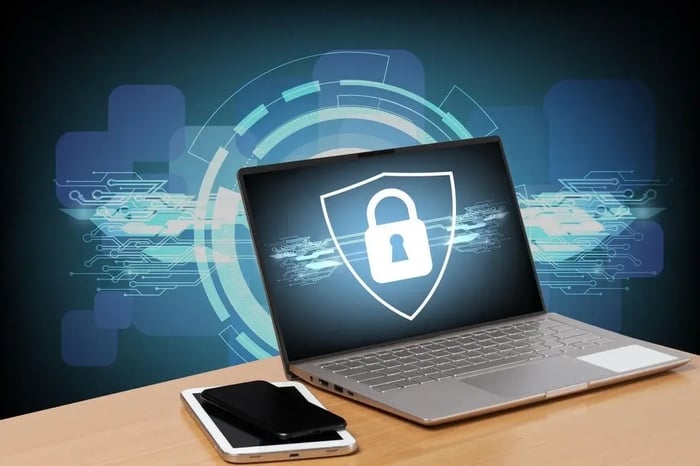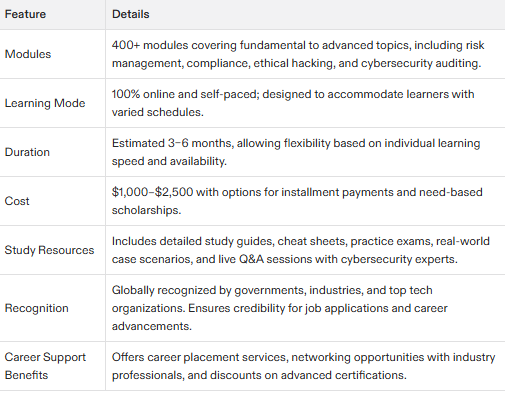Table of Contents
- Why Seek the Best Cybersecurity Certification for Beginners?
- 1. Establish Foundational Knowledge
- 2. Boost Job Credibility
- 3. Unlock Career Opportunities
- 4. Flexibility and Accessibility
- The Best Cybersecurity Certifications for Beginners in 2025
- How to Choose the Best Cybersecurity Certification for Beginners
- How to Leverage Your Cybersecurity Certification for Career Growth
- FAQs (People Also Ask)
In 2025, cybersecurity remains one of the most important aspects of the digital world. As cyber threats evolve and data breaches become more frequent, companies and individuals alike are focusing on securing their data and networks. The global cybersecurity market continues to grow, with businesses increasingly seeking skilled professionals to protect them from various threats.
As the demand for cybersecurity professionals rises, it has become clear that a career in cybersecurity offers excellent prospects for those looking to enter the field, and earning a Cybersecurity Certification Without Experience is a viable and increasingly popular pathway. For newcomers, one of the best ways to start a career in cybersecurity is by obtaining a certification. The Best Cybersecurity Certification for Beginners is an essential first step, as it offers you the foundational knowledge and skills necessary to thrive in this ever-growing field. This guide will explore some of the top certifications for beginners, their benefits, and why they are crucial in today’s digital landscape.
Why Seek the Best Cybersecurity Certification for Beginners?
Whether you are just starting out or pivoting into cybersecurity, investing in certification is a smart move. Here's why:
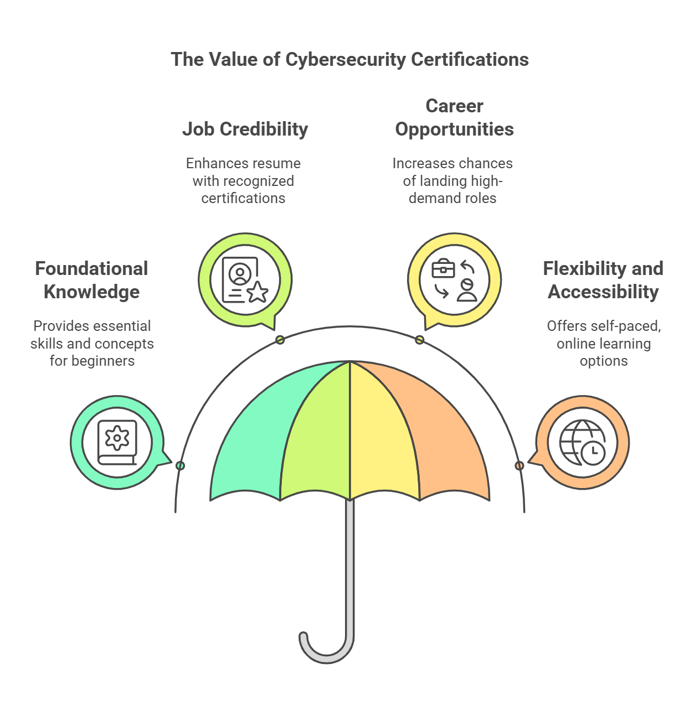
1. Establish Foundational Knowledge
Cybersecurity certifications are a starting point of understanding the foundational knowledge of the industry and its best practices. The primary concepts of network security, threat management, and incident response are introduced to beginners without overwhelming them with advanced topics. These basic skills are the building blocks of a good cybersecurity career that prepares you to deal with more complex problems as you gain experience in the field. In 2025, encryption, firewalls, and risk management will be more critical than ever.
2. Boost Job Credibility
Having a cybersecurity certification adds credibility to your resume, signaling to potential employers that you have the necessary skills to protect their digital assets. Certifications such as CompTIA Security+ or Google Cybersecurity Certificate are widely recognized by organizations globally. By demonstrating your commitment to cybersecurity through these certifications, you make yourself a more attractive candidate, whether you're applying for entry-level positions or looking to move up within your current company. In 2025, job seekers with recognized certifications will find it easier to stand out in the competitive job market.
3. Unlock Career Opportunities
The demand for cybersecurity professionals continues to grow at an unprecedented rate. Organizations worldwide are actively seeking qualified individuals to protect their networks, data, and systems from cyber threats. By obtaining a cybersecurity certification, you increase your chances of landing a job in roles such as Security Analyst, SOC Analyst, and Incident Response Specialist. These positions are not only in high demand but are also expected to grow by 10-12% in the next few years. As businesses face evolving cyber threats, the need for skilled professionals will only increase.
4. Flexibility and Accessibility
A major advantage of seeking a beginner certification in cybersecurity is the ease of access and flexibility that comes with it. Some certifications are self-paced, which means you can learn at your own free time and even from the comfort of your home or anywhere in the world. The Google Cybersecurity Certificate and CompTIA Security+ can be taken online and the work can be made to suit your time and lifestyle, depending on your personal and professional needs. This has been made even easier by the availability of online resources and the relatively cheap pricing of certifications, thus enabling newcomers to the field to achieve them.
The Best Cybersecurity Certifications for Beginners in 2025
To break into cybersecurity, it is important to know what certification to choose. There are several options in 2025, and they are different depending on career goals and learning attitudes. Here are some of the Best Cybersecurity Certifications for Beginners that are quite popular and well-appreciated by employers.
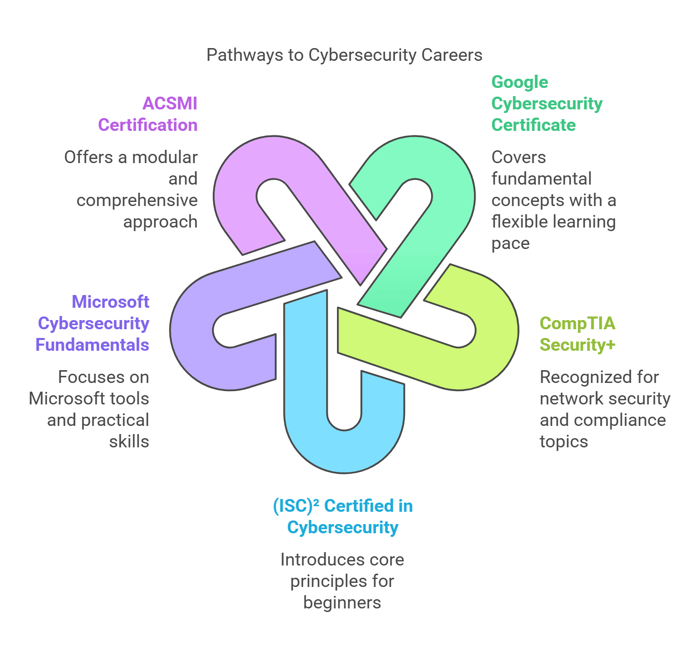
Google Cybersecurity Certificate
Google’s Cybersecurity Certificate is meant for beginners and teaches basic cybersecurity concepts like risk management, threat detection, and incident response. This program is perfect for the beginner in IT, providing a real world introduction to the field without the need to know much about it to start. The self-paced certification model enables students to learn at their own pace, making it a convenient way for the working class to learn. In 2025, Google’s certification is still one of the foremost for those starting off in the field.
CompTIA Security+
CompTIA Security+ is one of the most popular certifications for entry-level cybersecurity. It covers network security, encryption, identity management, and compliance in detail. The certification touches on a variety of topics that are important to securing systems and networks. In 2025, CompTIA Security+ stays a standard gold for beginners in the field and is commonly recognized by employers as an entry-level certification for roles like Security Analyst and Network Administrator.
(ISC)² Certified in Cybersecurity (CC)
The (ISC)² Certified in Cybersecurity (CC) is a relatively new certification that is specifically targeted towards individuals with no prior IT experience at all. This certification introduces core cybersecurity principles like threat management, network security, and risk analysis. The (ISC)² certification is for beginners and simplifies complex concepts, which makes it a good choice for people interested in beginning a career in cybersecurity. In 2025, this certification is still a good starting point for anyone new to the cybersecurity field.
Microsoft Cybersecurity Fundamentals
Microsoft has a Cybersecurity Fundamentals certification that covers the basics of cybersecurity—like identity protection, data security, and malware defenses. For those interested in Microsoft technologies and securing systems with Microsoft tools, this program is ideal. The certification is highly recognized and is a good starting point for those intending to work as a Security Engineer or Incident Response Specialist. This certification is still very much in use in 2025 because it is heavily oriented toward practical skills.
ACSMI Certification
The ACSMI Certification stands out as a modular, comprehensive certification that caters to both beginners and experienced professionals. With over 400 modules, it covers a broad range of cybersecurity topics, from foundational concepts to more advanced topics. This certification allows learners to progress at their own pace and dive deeper into specific areas of cybersecurity. In 2025, ACSMI Certification remains an excellent choice for those looking to gain a broad yet detailed understanding of cybersecurity practices. When comparing IBM vs Google Cybersecurity Certification, ACSMI provides a flexible and in-depth approach that appeals to a wide range of learners.
How to Choose the Best Cybersecurity Certification for Beginners
With so many certifications to choose from, selecting the right one can be a challenge. Here’s a guide on how to evaluate the Best Cybersecurity Certification for Beginners based on your personal preferences, career goals, and available time.
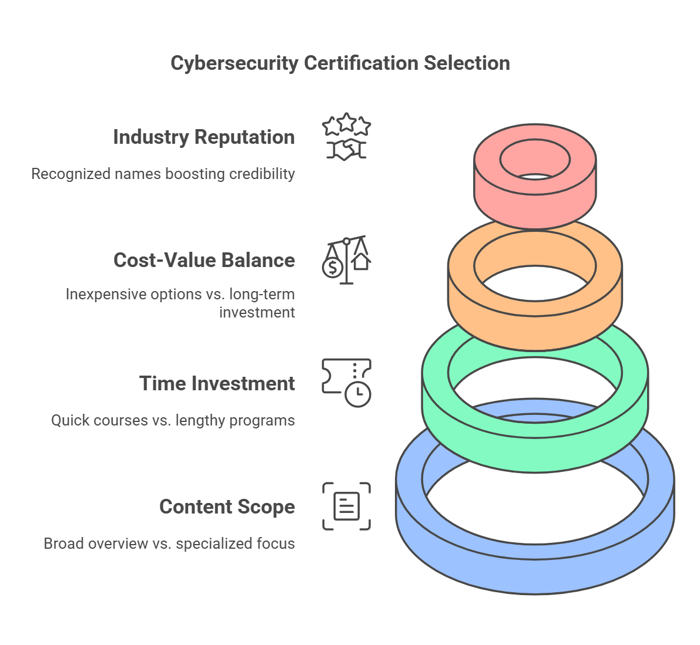
1. Content Scope
Each certification is aimed at varying aspects of cybersecurity. For instance, CompTIA Security+ covers almost everything from network security to risk management. However, (ISC)² CC concentrates more on the basic ideas of security principles. When selecting a certification, select the ones you are more interested in, such as network security, ethical hacking, or compliance frameworks. An all-encompassing certification like CompTIA Security+ is a good way to go for someone wanting to gain a general understanding of cybersecurity.
2. Time Investment
Time commitment is also an important factor to consider when choosing a certification. Some are relatively short, such as the few-week Google Cybersecurity Certificate, others, such as the ACSMI Certification, can take a few months because so much content is covered. Google's program is a good place to start if you are looking for a quick, entry-level certification. If you are looking for more of a month-long, multiple-month learning experience then the ACSMI Certification might be better.
3. Cost-Value Balance
Figure out how much you are willing to spend on your certification. There are some certifications, for instance, Microsoft Cybersecurity Fundamentals, that are quite affordable; others, for example, the ACSMI Certification, may be more expensive upfront. Nevertheless, ACSMI Certification is quite comprehensive and may well be a good long-term investment if you intend to focus or advance your career in the cybersecurity area. Compare the costs with the richness of the program in terms of content and versatility to identify the most cost-effective option for you.
4. Industry Reputation
Selecting a certification without understanding the reputation of the industry is illegal. CompTIA, Google, and (ISC)² are some of the biggest names in the cybersecurity certification domain. One of the benefits of the certification is that it is offered by a well-known provider, which also helps to ensure that the information being taught is relevant to the practice of the industry. In 2025, only certifications from these recognized firms will be appreciated by employers all over the world.
How to Leverage Your Cybersecurity Certification for Career Growth
Earning a cybersecurity certification is just the beginning of your journey. To truly excel in the field, you need to leverage your certification effectively to build your career.
Gain Practical Experience
While certification helps you gain theoretical knowledge, practical experience is what is needed most to learn the skills you need. Start with internships, part-time jobs, or freelance jobs that help you apply your knowledge in real-life situations. Cybersecurity challenges like Capture the Flag (CTF) events are a fun and effective way to gain practical experience, along with your learning. Thus, the best way to prove your skills is to demonstrate them through real-life work experience, which will only make your resume better and increase your chances of getting a job.
Pursue Advanced Credentials
Once you’ve established a solid foundation with a beginner certification, consider advancing your career by pursuing higher-level credentials. Certifications such as Certified Ethical Hacker (CEH), Certified Information Systems Security Professional (CISSP), and ACSMI Certification will help you move into more specialized and higher-paying roles. These advanced certifications build on the knowledge you’ve gained, providing deeper insights into specific areas of cybersecurity.
Specialize Your Skills
Cybersecurity is a broad field that has numerous niches, including cloud security, ethical hacking, incident response, and data protection. Without an understanding of these, it is easy to see why specializing in one of these areas not only enhances your expertise but also enhances your value to employers. It also enables one to develop expertise and become a thought leader in their area of choice, which can lead to better job opportunities, higher salaries, and management positions in cybersecurity teams.
Final Thoughts
Starting a career in cybersecurity in 2025 offers incredible opportunities, and the best way to begin is by obtaining a recognized certification. Whether you choose Google Cybersecurity Certificate, CompTIA Security+, or ACSMI Certification, each of these certifications will help you establish a strong foundation for your career. The demand for cybersecurity professionals continues to grow, and with the right certification, you can position yourself for success in this exciting and dynamic field.
FAQs (People Also Ask)
1. What is the best cybersecurity certification for beginners with no IT experience?
Google’s Cybersecurity Certificate and (ISC)² Certified in Cybersecurity are great options for individuals with no prior IT experience, as they are designed to introduce the basics of cybersecurity in a beginner-friendly manner.
2. Is CompTIA Security+ worth it in 2025?
Yes, CompTIA Security+ is one of the most respected entry-level certifications in the cybersecurity industry. It provides a comprehensive introduction to core cybersecurity concepts and remains highly valued by employers.
3. Can I pursue the ACSMI Certification as a beginner?
Yes, the ACSMI Certification is modular, starting with basic concepts and allowing beginners to build upon their knowledge. It’s suitable for those looking for a structured and detailed learning path.
4. How can I study for a cybersecurity certification while working full-time?
Many certifications, like CompTIA Security+ and Google Cybersecurity Certificate, offer self-paced online courses that allow you to balance study time with work commitments.
5. Do cybersecurity certifications guarantee a job?
While certifications significantly enhance your employability, combining them with hands-on experience, networking, and continuous learning is essential for securing a job in cybersecurity.
6. How long does it take to get a cybersecurity certification?
The time required to earn a certification varies depending on the program. Certifications like the Google Cybersecurity Certificate can be completed in a few weeks, while others like the ACSMI Certification may take several months.
7. What are the career prospects after earning a cybersecurity certification?
Earning a cybersecurity certification opens the door to a wide range of roles, such as Security Analyst, SOC Analyst, and Incident Response Specialist. The demand for cybersecurity professionals is expected to grow by 10-12% in the next few years, making career prospects excellent.
8. Can beginners switch to a cybersecurity career?
Yes, many certifications, including CompTIA Security+ and Google Cybersecurity Certificate, are designed for individuals transitioning into cybersecurity from other fields. These certifications provide the foundational knowledge needed to get started in the industry.



